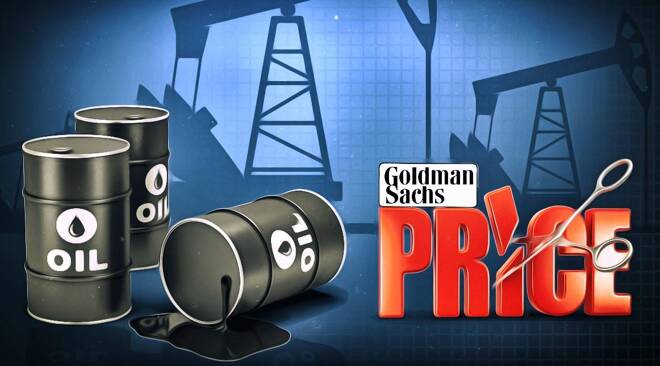Advertisement
Advertisement
Oil Continues To Falter As Goldman Sachs Turns Bullish
By:
The fall in crude oil prices sent shivers down the spines of investors on Monday. Nerves were already frayed ahead of the FOMC meeting and the Bank of
The fall in crude oil prices sent shivers down the spines of investors on Monday. Nerves were already frayed ahead of the FOMC meeting and the Bank of Japan decision due later this week. WTI reversed some of its losses late in the day but remained down 44 cents at 48.61 while Brent oil matched the declines to trade at 50.10 after falling below the $50 level. The sell-off is a continuation of the weakness seen in the markets on Friday, when oil tumbled almost 3%, as the markets continued to monitor the supply and demand imbalance that has kept oil prices subdued in the last couple of years. Oil took a huge hit when Asian markets opened on Tuesday morning with WTI down another ½ dollar at 48.35 and Brent at 49.87.
The U.S. Energy Information Administration said in its weekly report that crude oil inventories declined by 3.2 million barrels last week to 532.5 million. That was roughly 400,000 barrels more than the expected decline of 2.8 million barrels.
[wibbitz]bfad372d19d13432cba32a880ce12d590[/wibbitz]
After hitting bottom in January when it slipped as low as $28 a barrel, oil has now gained nearly 80%, and there is an increasing feeling within the markets that things are starting to rebalance, which will in turn help to boost prices, although that feeling seems to have ebbed a little on Monday.
The rebound in prices was due to additional production disruption in Nigeria, continued worries about the amount of crude that Venezuela will be able to produce as the country’s economy continues to plunge deeper into crisis, and a note by Goldman Sachs saying the oil market’s oversupply problem may have come to an end.
According to Bloomberg “While most of the oil-price decline in 2014 could be explained by the significant increase in the supply of oil, more recently the lower price has reflected weaker global demand,” the ECB said on Monday in an article from its Economic Bulletin. “Although the low oil price may still support domestic demand through rising real incomes in net oil-importing countries, it would not necessarily offset the broader effects of weaker global demand.”
The analysis strikes at the ECB’s debate over whether it should be adding monetary stimulus to the euro-area economy as lower heating and fuel bills give consumers more spending power. President Mario Draghi has argued that as well as depressing inflation — the ECB’s main challenge — a drop in energy prices can be a sign of subdued economic activity that needs to be countered.
The oversupplied oil market is on track to rebalance later this year as economic growth spurs demand against a backdrop of falling US production and a string of supply outages.
The Organization of Petroleum Exporting Countries said in its latest monthly report that commercial crude stocks declined by eight million barrels in May. By contrast, global stocks increased by 12 million barrels in March and April, and by 19 million barrels in February.
The chronic glut of oil forced market prices to their lowest point in 12 years in January, but as the excess supply dwindles, prices have rallied higher. OPEC’s reference price for May averaged $43.21 a barrel, a gain of $5.35 compared to the previous month. Global demand growth for 2016 remained unchanged from last month’s report at 1.2 million barrels per day, or a daily average of 94.18 million barrels. In 2015 demand growth averaged 1.54 million barrels a day for a daily average of 92.98 million barrels, according to OPEC.
About the Author
Barry Normanauthor
Advertisement
